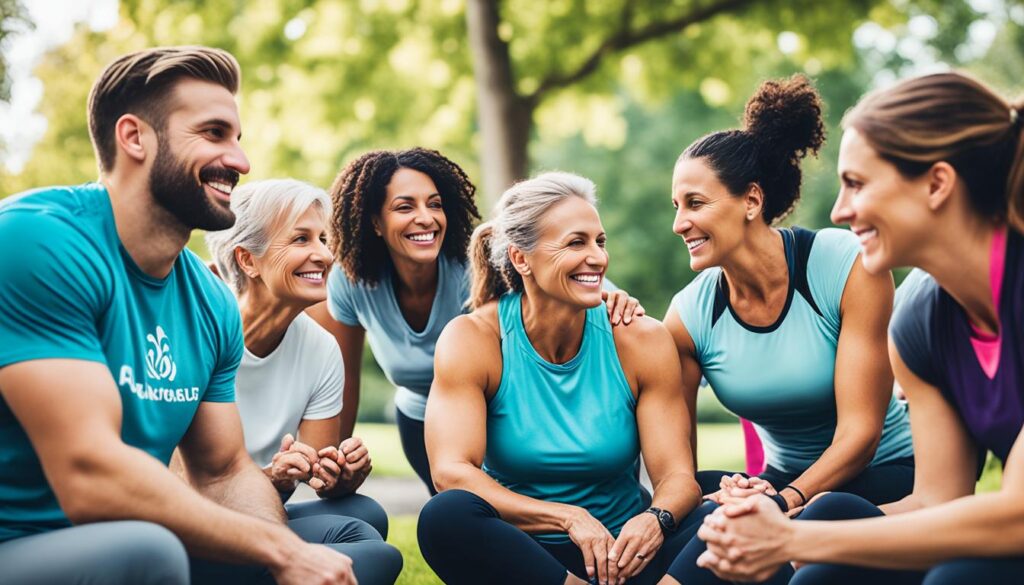Did you know that being active can cut down the risk of serious health issues like stroke and high blood pressure1? Also, joining mental health groups can make you feel better emotionally and more satisfied with life. Together, mental health support and exercise offer a full way to get well that’s easy to follow. In these groups, you’re part of a community focused on mental and physical health.
Being active in these groups helps you meet the 150 minutes of moderate exercise needed each week1. This not only helps with weight control but also lowers the chance of feeling down or anxious. Plus, it makes you stronger and helps your heart work better, which can make you feel more energetic and sleep better1. The mix of support, emotional help, and exercise is perfect for feeling whole again. Joining mental health and fitness groups brings you into a caring community that lifts your mental and physical health.
Introduction to Mental Health & Fitness Support Groups
Support groups for mental health and fitness are key for those looking to improve their well-being. They combine mental wellness with physical fitness, offering support and accountability. This mix is vital for a full health approach.
Studies show that 89% of 1,158 studies from 1990 to 2020 link physical activity with better mental health2. Being active in these groups can greatly boost mental health and lessen depression and anxiety symptoms2.
These groups also offer structure and guidance, acting as allies for health improvement. The Centers for Disease Control and Prevention suggest kids aged 6 to 17 should get at least an hour of physical activity daily3. Adults need 150 minutes of moderate exercise each week for good health4.
Support groups help people with serious mental illnesses, who often face a shorter life span, find vital support4. They focus on activities that help with mood, sleep, and mental health. This can lower the risk of other health issues like heart disease and diabetes4.
With a focus on both mental wellness and fitness, these groups are crucial for health improvement. They offer a wide range of support, leading to better mental and emotional health.
Enhancing Brain Health Through Support Groups
Support groups are key for brain health. They help with cognitive function and neurogenesis. Being part of these groups can boost brain health through social interaction and activities.
Improved Cognitive Function
Being active in support groups can make your brain work better. Studies with 1.2 million people in the USA from 2011 to 2015 found a link between exercise and mental health5. This link shows the good effects of aerobic and muscle-strengthening exercises.
Research says exercise helps the brain stay sharp, especially in older people5. Joining support groups that focus on exercise can improve your memory and attention. It can also make your brain work better overall.
Combatting Neurogenesis Issues
Support groups help with neurogenesis by offering activities that boost brain cell growth. These activities make sure the brain gets enough blood, oxygen, and nutrients. This helps new brain cells grow.
Exercise can change levels of certain substances in the body and improve brain functions in older people with mild memory loss5. It’s as good as some medicines for treating anxiety and mood issues6.
One year of exercise can make the hippocampus bigger in people with memory problems6. The hippocampus is important for memory and feeling emotions. Exercise can also reduce inflammation in the brain, which helps with Alzheimer’s disease5.
So, support groups that push for regular exercise can fight neurogenesis issues. They help keep the brain healthy overall.
7 Benefits of Joining a Mental Health and Fitness Support Group
Joining a mental health and fitness support group has many benefits. One big plus is the steady mental health community support you get. Being part of these groups can make you feel better by releasing happy chemicals in your brain.
Doing exercises with others can help with depression and anxiety7. Group classes or fun activities with friends make you feel part of a community. This feeling is key for your fitness and wellbeing.
Working out with a friend makes you stick to your routine more. You’re 42% more likely to keep going than if you were alone8. Plus, having a buddy can make your workouts last up to 200% longer8.
Support groups let you share ways to cope and get new ideas. Sharing stories helps boost your confidence and makes you stronger emotionally. With a workout buddy, you’re 74% more likely to try new exercises8.
Having a workout partner means you’re 35% less likely to miss a session8. This support boosts your motivation by 65%, making exercise fun and rewarding8.
Mental health community support groups also help with chronic pain. If you have ongoing muscle or joint pain, you’re more likely to feel anxious or depressed7. Regular group exercise can ease these feelings. Plus, exercising with others shows you believe in yourself more, feel better about yourself, and know your body better7.
In short, mental health and fitness groups do more than just help your body. They boost your mental health, improve your social life, and create a place where you can reach your fitness goals.

Support Groups Provide Emotional and Social Benefits
Being part of support groups brings big emotional and social perks. It boosts emotional health by creating strong bonds and a sense of community. People in these groups feel seen and heard, which is very important.

Building Confidence and Self-Esteem
Support groups are key in boosting confidence and self-esteem. They let members share their wins, which helps everyone feel good about themselves. Studies show that being in these groups changes how people see their problems, leading to better emotional health and ways to cope9.
Shared Coping Strategies
Support groups share tips on how to deal with life’s tough moments. They teach about mental health and stress management, giving members useful skills for everyday life9. These groups also help improve heart health and fight loneliness for those with mental health issues10.
Sense of Belonging
Being in a support group makes you feel like you belong, which is great for your emotional health. The safe and accepting space helps you work through feelings, which is key for better emotional control9. Having friends in these groups is key to using coping strategies well10. This helps a lot with getting better in mental health.
Access to Professional Guidance and Resources
Joining mental health and fitness groups gives you access to expert mental health resources and professional fitness guidance. This is key for those looking for support that fits their needs. Being part of these groups means getting help from experts. This helps build lasting health habits and gives the right info for moving forward in wellness.
Studies show that being active can make you feel better mentally and improve your life quality. Adults who exercise daily have a 20% to 30% lower risk of feeling depressed or getting dementia11. Also, regular exercise can lessen symptoms of depression and anxiety, often suggested before taking medicine12.
Getting personal support also means getting fitness plans from experts. These plans are key in reaching health goals. For example, adults need 75 to 150 minutes of exercise each week to stay healthy11. In 2015, only 65.5% of men and 54% of women hit this activity level, showing the need for better and more tailored fitness advice11.
Experts also suggest activities that can fix stress-related brain damage by making more neurohormones. These improve thinking and mood12. Cardio exercises, recommended by experts, help make new brain cells and strengthen memory, boosting brain function and preventing decline12.
Support groups provide informed wellbeing support backed by science. They help improve self-esteem, reduce stress and anxiety, and make life better through structured help and expert advice.
| Benefits | Description |
|---|---|
| Improved Mental Health | Lower risk of depression and anxiety, better stress management, increased self-esteem1112. |
| Enhanced Physical Health | Regular physical activity boosts mood, improves sleep quality, and supports neurogenesis12. |
| Personalized Guidance | Expert plans and resources tailored to individual needs for sustainable health habits1112. |
Conclusion
Mental health and fitness support groups bring many benefits. They help with both mental and physical health. By using evidence-based practices like regular exercise, they can reduce depression and improve thinking skills132>.
These groups create a strong sense of community. People share ways to cope and feel more confident. This is especially helpful for those with ADHD or Generalized Anxiety Disorder132>.
Joining a support group is a great way to get better overall health. They offer community support, professional advice, and ways to live well. These groups help people deal with life’s challenges in a holistic way.



